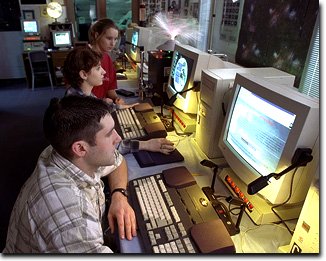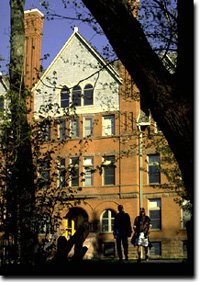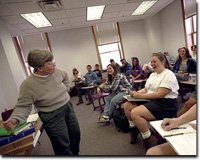|
The admissions information below is valid for the 2007-08 academic year.
|

|
| Admissions officer: |
Katie Gellatly,
Director of Admission |
| Contacting the office: |
715 682-1224
800 753-1840 (toll free)
715 682-1258 (fax)
admit@northland.edu |
|
| Is there an application deadline for fall? |
yes |
| Priority filing date for fall: |
May 1 |
| Final filing date for fall: |
August 15 |
| Freshmen are accepted for terms other than fall: |
yes |
| Percent of freshmen who enter in terms other than fall: |
15% |
| Application fee: |
$25 |
| Can the application fee be waived? |
yes |
| Are refunds available on the application fee? |
no |
| Is the Common Application form accepted? |
yes |
| Supplemental forms required for those using Common Application: |
no |
| High school graduation is: |
required, GED is accepted |
| A general college preparatory program is: |
required |
| Campus visit is: |
recommended |
| Interview is: |
recommended |
| Off-campus interview: |
can be arranged with admissions representative |
| Visit for interview by: |
spring |
| Standardized test requirements: |
SAT I considered if submitted, ACT considered if submitted, SAT I or ACT required, SAT II recommended |
| School's test preference: |
no preference |
| Aside from admissions, test scores are used for: |
counseling |
| Dates test scores should be received: |
August 15 for SAT I/ACT, August 15 for SAT II |
| High school units required or recommended: |
| English: |
4 required, 4 recommended |
| Foreign language: |
2 recommended |
| Lab: |
2 required, 2 recommended |
| Math: |
3 required, 3 recommended |
| Science: |
3 required, 3 recommended |
| Social studies: |
3 required, 3 recommended |
| Academic electives: |
3 required, 4 recommended |
| Total: |
18 required, 21 recommended |
|
| Special requirements for admission to specific programs: |

|
- Portfolio required of art program applicants.
- Audition required of music program applicants.
|
|
| Special programs/policies for applicants not normally admissible: |
conditional admission |
| School has formalized early decision program: |
no |
| School has early action program: |
no |
| School has concurrent enrollment program for high school: |
no |
|
| Academic criteria: |

|
- secondary school report very important
- class rank important
- recommendations important
- standardized test scores important
- essay important
|
|
| Nonacademic criteria: |

|
- interview considered
- extracurricular activities considered
- particular talent/ability considered
- character/personal qualities considered
- alumni/ae relationship considered
- geographical residence not considered
- state residency considered
- religious affiliation/commitment considered
- minority affiliation considered
- volunteer work considered
- work experience considered
|
|
| Admissions is need blind: |
yes |
| Average secondary school GPA: |
3.35 |
| Percent of freshmen who submitted GPA: |
99% |
| Percent of student body in each high school class rank: |
Top tenth: 27%
Top quarter: 50%
Top half: 80% |
| Average SAT I: |
1164 combined |
| Average ACT: |
24 composite |
| Combined ACT middle 50% range: |
21 - 27 |
| Percent of accepted applicants who submitted SAT I scores: |
19% |
| Percent of accepted applicants who submitted ACT score: |
86% |
|
| Notification of admission: |
on a rolling basis, by January 1 |
| Acceptance of admission: |
must accept by May 1 or within 3 weeks if notified thereafter |
|
| Number of applicants offered admission: |
883 |
| Number of applicants offered admission who enrolled: |
180 |
| School has a waiting list policy: |
no |
| Tuition deposit amount: |
$200, nonrefundable |
| Admission may be deferred: |
yes, up to 1 semester |
|
|
| Semester/term begin dates: |
in September, January, and June. |
| Calendar system: |
4-1-4 system (two semesters & one-month January interterm) |
| Month(s) in which new student orientation is held: |
Orientation for new students held in August and September. |
| Number and length of summer sessions: |
One summer session of five weeks. |
|
| Majors with the highest enrollment: |
biology, environmental studies, outdoor education |
| Average freshman GPA: |
2.8 on a 4.0 scale |
| Percent of full-time freshman students who returned for sophomore year: |
87% |
| Student:Faculty ratio: |
13:1 |
| Total faculty: |
52 men, 29 women, 81 total |
| Full-time faculty: |
31 men, 9 women, 40 total |
| Part-time faculty: |
21 men, 20 women, 41 total |
|

|
| General education/core curriculum is required: |
yes |
| Minor requirements: |
not required for graduation |
| Physical education is required: |
yes |
| There are religious requirements for graduation: |
yes |
|
| Special programs offered: |

|
student-designed majors, double majors, dual degrees, independent study, accelerated program, honors program, pass/fail grading option, internships, external degree program |
|
| Minors and other miscellaneous programs offered: |

|
Minors offered in geographic information sciences, geoscience, outdoor education/adventure education, and peace and global studies. |
|
| Preprofessional programs offered: |

|
pre-law, pre-medicine, pre-veterinary science, pre-theology |
|
| Education certifications: |

|
elementary, middle/junior high, secondary |
|
| Cooperative education programs: |

|
engineering, natural science |
|
| Combined 3-2 programs available: |

|
3-2 engineering, forestry, and natural resources management programs with Michigan Tech U. |
|
| Graduate schools/programs are offered: |
no |
| Qualified undergraduates may take graduate-level classes: |
no |
| Schools with which domestic exchange programs are offered: |
Exchange programs with Allegheny Coll and Beloit Coll. |
| Study abroad opportunities: |

|
Exchange program abroad in Japan (Hagoromo Coll). Study abroad also in Chile, Costa Rica, Greece, Italy, Jamaica, Kenya, Mexico, and the former Soviet Republics. |
|
| Other special or unique academic programs: |

|
Evening Degree Completion Program is for adult learners who have completed two years of college. The program is accelerated. Bachelor degree in nursing. Northland offers the last two years of the BSN. |
|
| Army ROTC: |
not offered |
| Navy ROTC: |
not offered |
| Air Force ROTC: |
not offered |
|

|
Bachelor's Degrees
- American Indian/Native American Studies
- Animal Behavior
- Art
- Biochemistry
- Biological Sciences
- Biology
- Business/Economics
- Chemistry
- Ecology
- Elementary Education
- English
- English Creative Writing
- English Writing
- Environmental Biology
- Environmental Chemistry
- Environmental Science
- Environmental Science/Biology
- Environmental Science/Conservation Biology
- Environmental Science/Geology
- Environmental Sciences
- Environmental Studies
- Fine Arts
- Geoscience
- History
- Mathematics
- Meteorology
- Native American Studies
- Natural Resources
- Outdoor Education
- Paralegal
- Peace/Global Studies
- Pre-Dentistry
- Pre-Engineering
- Pre-Law
- Pre-Medical
- Pre-Medicine
- Pre-Veterinary Medicine
- Psychology
- Religion/Philosophy
- Secondary Education
- Sociology
- Veterinarian Life Science
- Veterinary Science
- Water Resources
- Water Science
- Writing
|
|
|
| Credit placement options: |

|
- placement for CEEB Advanced Placement (scores of 3 or higher)
- placement for CLEP general
- placement for CLEP subject
- neither credit nor placement for Regents College Exams (RCE)
- neither credit nor placement for ACT PEP
- neither credit nor placement for DANTES
- credit and/or placement for school's own challenge exams
- credit for relevant military experience
- credit for relevant life experience
- credit for international baccalaureate
|
|
|
|
The financial aid information below is valid for the 2007-08 academic year.
|
| Financial aid officer: |
Deb Milanowski,
Interim Director of Financial Aid |
| Contacting the office: |
715 682-1255
finaid@northland.edu |
| FAFSA number: |
003875 |
|
| Comprehensive tuition/room/board fees: |
$28,061 |
| Tuition notes: |
comprehensive tuition/room/board fees, in-state tuition based on per credit hour, out-of-state tuition based on per credit hour |
|
| Required form |
Priority date |
Rolling? |
Closing date |
| FAFSA | March 15 | yes | N/A |
|
| Date award notification begins: |
March 1 |
| Applied for financial aid: |

|

|
| 93% | of first-year students |
| 94% | of full-time undergraduates |
|
| Determined to have financial need: |

|

|
| 91% | of first-year students |
| 90% | of full-time undergraduates |
|
| Students determined to have financial need who received any financial aid: |

|

|
| 100% | of first-year students |
| 100% | of full-time undergraduates |
|
| Students determined to have financial need who received any need-based gift aid: |

|

|
| 98% | of first-year students |
| 98% | of full-time undergraduates |
|
| Students receiving financial aid who received need-based self-help aid: |

|

|
| 100% | of first-year students |
| 95% | of full-time undergraduates |
|
| Students receiving financial aid who received any non-need-based gift aid: |

|

|
| 2% | of first-year students |
| 2% | of full-time undergraduates |
|
| Students receiving financial aid whose need was fully met (excluding PLUS loans and private alternative loans): |

|

|
| 13% | of first-year students |
| 15% | of full-time undergraduates |
|
| Average percent of need that was met of students who received any need-based aid (excluding PLUS loans and private alternative loans): |

|

|
| 87% | for first-year students |
| 82% | for full-time undergraduates |
| 0% | for part-time undergraduates |
|
| Average financial aid package (excluding PLUS loans and private alternative loans): |

|

|
| $20,812 | for first-year students |
| $18,081 | for full-time undergraduates |
| $0 | for part-time undergraduates |
|
| Average need-based gift award: |

|

|
| $15,049 | for first-year students |
| $12,618 | for full-time undergraduates |
| $0 | for part-time undergraduates |
|
| Average need-based self-help award (excluding PLUS loans and private alternative loans): |

|

|
| $5,234 | for first-year students |
| $5,743 | for full-time undergraduates |
| $0 | for part-time undergraduates |
|
| Average need-based loan (excluding PLUS loans and private alternative loans): |

|

|
| $3,995 | for first-year students |
| $4,296 | for full-time undergraduates |
| $0 | for part-time undergraduates |
|
| Students who had no financial aid need and who received non-need-based aid (excluding athletic awards and tuition benefits): |

|

|
| 15% | of first-year students |
| 14% | of full-time undergraduates |
|
| Average award to students who had no financial aid need and who received non-need-based aid (excluding athletic awards and tuition benefits): |

|

|
| $9,309 | for first-year students |
| $8,318 | for full-time undergraduates |
| $0 | for part-time undergraduates |
|
| Students who received a non-need-based athletic award: |

|

|
| 0% | of first-year students |
| 0% | of full-time undergraduates |
|
| Average non-need-based athletic award: |

|

|
| $0 | for first-year students |
| $0 | for full-time undergraduates |
| $0 | for part-time undergraduates |
|
| School participates in Federal Work-Study Program: |
yes |
|
| Types of loans available: |

|
- FFEL Subsidized Stafford Loans
- FFEL Unsubsidized Stafford Loans
- FFEL PLUS Loans
- Federal Perkins Loans
|
|
| Parent loans packaged to meet need: |
no |
| Types of payment plans: |

|
- Tuition Management Systems
|
|
| Need-based scholarships/grants available: |

|
- need-based (general)
- Federal Pell Grants
- SEOG
- state scholarships/grants
- college/university scholarships/grants (institutional funds)
- private scholarships/grants
- Bureau Of Indian Affairs
|
|
| Non-need-based scholarships/grants available: |

|
- non-need-based (general)
- academic merit scholarships/grants
- creative arts/performance
- special achievements/activities
- special characteristics
|
|
|
|
| Total undergraduates: |
312 men, 427 women, 739 total |
| Full-time undergraduates: |
285 men, 364 women, 649 total |
| Part-time undergraduates: |
27 men, 63 women, 90 total |
| Average age of full-time undergraduates: |
21 |
| U.S. region where majority of students come from: |
Midwest |
| Percent of full-time U.S. undergraduates from out of state: |
76% |
| First-year student breakdown: |

|

|
| 2.8% | Black (non-Hispanic) |
| 1.1% | American Indian or Alaskan Native |
| 2.2% | Asian or Pacific Islander |
| 3.3% | Hispanic |
| 86.1% | White (non-Hispanic) |
| 4.4% | race/ethnicity unreported/unknown |
|
| Undergraduate breakdown: |

|

|
| 1.9% | Black (non-Hispanic) |
| 2.6% | American Indian or Alaskan Native |
| 1.3% | Asian or Pacific Islander |
| 1.9% | Hispanic |
| 88.1% | White (non-Hispanic) |
| 1.4% | total international (nonresident aliens) |
| 2.8% | race/ethnicity unreported/unknown |
|
|
|
|
| City or town school is located in: |
Ashland |
| Population of city/town: |
9,000 |
| Nearest major city: |
Duluth |
| Distance of nearest major city: |
60 miles |
| Population of nearest major city: |
80,000 |
|
| Institution offers housing: |
yes |
| Campus housing available to all unmarried students regardless of year: |
yes |
| Housing types (% in housing type, if given): |

|
- coed dorms (85%)
- women's dorms (14%)
- single-student apartments
- cooperative housing (1%)
- other housing including Townhouses
|
|
| Percent of freshmen who live in school housing: |
95% |
| Percent of students who live in school housing: |
65% |
| Percent of students who live off campus: |
35% |
| Percent of all students who have cars on campus: |
60% |
| Student conduct policies: |

|
class attendance policies set by individual instructors, hazing prohibited |
|
| Alcohol is permitted on campus to students of legal age: |
yes |
|
| Every student is required to lease or own a computer: |
no |
| Every student is required to take a computer course: |
no |
| Computer equipment is provided in: |
residence halls, library, computer center/lab(s) |
| Total number of microcomputers available to students: |
400 |
| Other computer facilities/services: |
The Bridge - an online portal for students to check courses, financial aid, billing, and other events. Online office hours and course discussions can occur on the bridge as well. |
| Internet access provided to all students: |
yes |
| E-mail services/accounts provided to all students: |
yes |
| School has a library on campus: |
yes |
|
| Remedial learning services: |

|
reading, writing, math, study skills |
|
| Additional services offered: |

|
nonremedial tutoring, placement service, health service, women's center, health insurance |
|
| Counseling services: |

|
minority student, birth control, career, personal, academic, psychological, religious |
|
| Career placement services: |

|
co-op education, internships, career/job search classes, interest inventory, on-campus job interviews, resumé assistance, alumni services, interview training |
|
| Services for students with disabilities: |

|
note-taking services, tape recorders, tutors, reader services, interpreters for hearing-impaired, adaptive equipment |
|
| Amount of campus that is accessible to physically handicapped: |
75% |
|
| Number of social fraternities on campus: |
0 |
| Number of social sororities on campus: |
0 |
| Student activities: |

|
student government, student newspaper, literary magazine, yearbook, radio station, television station |
|
| School newspaper(s): |
Drifts (once per month); Wedge (once per year); Mosaic (once per year) |
| Total number of registered organizations: |
50 |
| Campus-based religious organizations: |

|
Newman Club |
|
| Minority student organizations: |

|
Native American Student Association |
|
| Other student organizations, musical groups, activities, and committees: |

|
jazz band, orchestra, choir, drama club, business administration group, Campus Scouts, environmental action group, outing club, ecology club |
|
|
| School has an athletic program: |
yes |
| Athletic director: |
Steve Wammer,
Director of Athletics and Recreation |
| Director of women's athletics: |
shelly roiger,
SWA |
| Athletic department's mailing address: |
Director of Athletics
Northland College
1411 Ellis Avenue
Ashland, WI 54806
|
| School mascot: |
Lumberjacks/Lumberjills |
| Sports offered |
Scholarships? |
Athletic Assoc. |
| Men's baseball | no | NAIA III, NCAA Div. 3 |
| Men's baseball | no | |
| Men's basketball | no | |
| Men's cross-country | no | |
| Men's cross-country | no | NAIA III, NCAA Div. 3 |
| Men's ice hockey | no | |
| Men's soccer | no | |
| Women's basketball | no | |
| Women's cross-country | no | NAIA III, NCAA Div. 3 |
| Women's cross-country | no | |
| Women's soccer | no | |
| Women's softball | no | |
| Women's softball | no | NAIA III, NCAA Div. 3 |
| Women's volleyball | no | |
|
| Percent of students in varsity/club intercollegiate sports: |
12% |
|
| Public transportation serves campus: |
yes |
| Nearest international airport: |
Duluth (60 miles) |
| Nearest other airport: |
Duluth (60 miles) |
| Nearest passenger train service: |
Superior (55 miles) |
| Nearest passenger bus service: |
Ashland (1 mile) |
|
| Institutional employment is available: |
yes |
| Percent of full-time undergraduates working on campus: |
60% |
| Off-campus employment opportunities for undergraduates are: |
good |
| Freshmen are discouraged from working for first term: |
no |
|
| Percent of graduates who pursue further study: |
25% within 5 years of graduation |
| List of graduate schools most often selected by recent graduates: |

|
University of Wisconsin Madison
Vermont Law School
Temple
UM Twin Cities
Michigan State
Harvard University
University Nevada Reno
Colorado State
University of Minnesota Duluth
University of Vermont
University of Montana
University of Wisconsin Eau Claire
University of Wisconsin Superior
University of Wisconsin Stout
University of Virginia
University of Colorado
|
|
| Percent of graduates who enter job market in field related to major: |
95% within six months of graduation |
| List of firms that most frequently hire graduates: |

|
DNR
Parks and Recreation Center
Abbott Laboratories
Peace Corps
National Forest Service
Americorp
National Weather Service
USGS
Northland College
Green Peace
Sierra Club
REI
Student Conservation Association
Conservation Corp
|
|
| List of most prominent alumni/ae: |

|
- Jambling Norgay - son of Tenzig Norgay, first to climb Mount Everest with Hilary.
|
|
|




